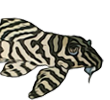Matoso DA, HCMd Silva, AL Ferreira Júnior, F Porto-Forest, R Utsunomia, FDd Prado & RF Artoni, 2025. Is there hidden genetic variability in the species of Steindachneridion Garavello, 2005 (Siluriformes: Pimelodidae)? PeerJ 13:e18193
Abstract
Background
The genus Steindachneridion, which includes large-sized freshwater pimelodid species, is endemic to the southeastern coastal drainages of South America, specifically the Paraná River and Uruguay River basins.
Methods
In this study, genetic analyses of mitochondrial DNA (mtDNA) D-loop were conducted on four species within this genus across their respective distributions: Steindachneridion scriptum (from the Tibagi and Uruguay rivers), S. melanodermatum (from the Iguaçu River), S. doceanum (from the Doce River), and S. parahybae (from the Paraíba do Sul River). Zungaro zungaro and Brachyplatystoma rousseauxii were employed as outgroups, and the topology was inferred using Bayesian Inference (BI) and maximum likelihood (ML) phylogenetic reconstruction techniques. Additionally, the sequences were analyzed to assess genetic diversity levels.
Results
In contrast to the remaining species, which exhibited distinct species-specific clades, our data suggests that S. scriptum formed two sister clades, potentially representing distinct operational taxonomic units. Novel haplotypes were identified for each of the four species, further supporting the conclusions derived from the phylogenetic analysis. Overall, Steindachneridion species displayed high haplotype diversity paired with low nucleotide diversity, indicating a demographic expansion event after reduced effective population size. Nevertheless, genetic structure indexes were notably high. These findings suggest that the genetic diversity within these species may be underestimated, which has implications for both taxonomic classification and biological conservation strategies.
Conclusion
In conclusion, the study of genetic diversity in four Steindachneridion species has revealed distinct molecular operational taxonomic units (MOTUs), which highlights the necessity for conservation efforts. The detection of new haplotypes and intraspecific variability emphasizes the urgency of implementing systematic conservation measures in the face of looming extinction threats.
Is there hidden genetic variability in Steindachneridion?
- Silurus
- Posts: 12452
- Joined: 31 Dec 2002, 11:35
- I've donated: $12.00!
- My articles: 55
- My images: 896
- My catfish: 1
- My cats species list: 90 (i:0, k:0)
- Spotted: 428
- Location 1: Singapore
- Location 2: Moderator Emeritus





